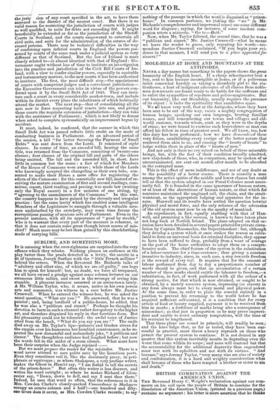MOLE-HILLS AT HOME AND MOUNTAINS AT THE ANTI P ODES.
NEVER a day passes but something in the papers shows the great humanity of the English heart. If a cheap schoolmaster beat a boy, sent to him because incorrigible at home, or if a policeman insist somewhat harshly on taking a disorderly girl to the sta- tionhouse, a host of indignant advocates of all classes from noble- men downwards are found ready to do battle for the sufferers and to enlist the sympathies of reporters and police-magistrates. But our humanity, like our friendship, usually requires the presence of its object : it lacks the spirituality that annihilates space.
We all know very well, that at the Antipodes, where they have been sent to be out of the way, exists a mighty congregation of human beings, speaking our own language, bearing familiar names, and still remembering our towns and villages and old- world customs, towards whom, sunk as they were in the depths of crime, we were bound to exercise such benevolence as man can afford his fellow in time of greatest need. We all know, too, how this duty has been performed ; how we have demoralized these very felons, annihilating every vestige of the better nature that rendered them akin to us, and causing the "hearts of beasts" to lodge within them in place of the "hearts of men." And not only is there no cry raised on behalf of these miserable beings, but, with the fact of their condition broadly admitted, new ship-loads of those, who, in comparison, may be spoken of as uncontaminated, are sent out month after month to be absorbed in the corrupted mass. This is the effect of mere indifference, and not of any doubt as to the possibility of a better course. There is scarcely a man among the active spirits of the middle and lower classes but could tell us that the system adopted in our Penal Colonies must neces- sarily fail. It is founded in the same ignorance of human nature, or at least of the aberrations of human nature, as that which for centuries maintained the unglazed cell, the chain, and the strait- waistcoat, as the appropriate lodging and apparatus for the in- sane. Hanwell and its results have settled the question betwixt physical and moral force, and the only reliance of the advocates of the old system must now be on the apathy of mankind.
An experiment, in fact, equally startling with that of Han-
well, and promising a like success, is known to have taken place not long back at Norfolk Island. The plans adopted on that oc- casion have been detailed in several papers printed for private circu- lation by Captain Maconochie, the Superintendent : but, although they develop a system which at once strikes the reason as calcu- lated to form an universal basis for criminal discipline, they appear to have been suffered to drop, probably from a want of courage on the part of the home authorities to adopt them on a compre- hensive scale. The chief feature of the system is the substitution of a labour-sentence for a time-sentence ; thus giving a constant incentive to industry, since, in such case, a step towards freedom is the reward of every toil. It requires that for the amount of labour performed from day to day a proportionate number of marks should be given, and that an accumulation of a certain number of these marks should entitle the labourer to freedom,—a substitution, in fact, of work performed with all the ardour of a strong motive, for that which is now obtained, or sought to be obtained, by a merely coercive system, depressing (as slavery in any form always must be) to every moral and physical power. At the same time, in order to place the convict entirely in a position to prevent his returning to the world before he has acquired sufficient self-control, it is a condition that for every article of food or luxury supplied, payment is to be received from him in marks ; a forfeiture of marks being also a consequence of misconduct ; so that just in proportion as he may prove improvi- dent and unable to resist ordinary temptations, will the time of his restraint be lengthened.
That these plans are sound in principle, will readily be seen;
and the knoviedge that, as far as tested, they have been suc- cessful in practice, must throw a heavy reproach on those who permit the present system to continue. It is not denied in any quarter that this system inevitably results in degrading even the worst that come within its scope ; and none will contend but that the accountability for the additional depravity thus engendered must rest with its upholders and not with its victims. "And because," says Jeremy Taylor, "very many sins are sins of society and confederation, it is a hard and weighty consideration what shall become of those who have tempted a brother or sister to sin and death."


























 Previous page
Previous page